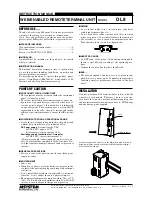
© National Instruments
|
5-3
On NI 628
x
devices, the AO reference of each analog output can be individually set to one
of the following:
–
±10 V
–
±5 V
–
±APFI <0,1>
–
±AO <0..3>
You can connect an external signal to APFI <0,1> to provide the AO reference.
You can route the output of one of the AO <0..3> signals to be the AO reference for a
different AO <0..3> signal. For example, AO 0 can be routed to be the AO reference of
AO 1. This route is done on the device; no external connections are required.
You cannot route an AO channel to be its own reference.
The AO reference can be a positive or negative voltage. If AO reference is a negative
voltage, the polarity of the AO output is inverted.
Note
When using an external reference, the output signal is not calibrated in
software. You can generate a value and measure the voltage offset to calibrate your
output in software.
Minimizing Glitches on the Output Signal
When you use a DAC to generate a waveform, you may observe glitches on the output signal.
These glitches are normal; when a DAC switches from one voltage to another, it produces
glitches due to released charges. The largest glitches occur when the most significant bit of the
DAC code changes. You can build a lowpass deglitching filter to remove some of these glitches,
depending on the frequency and nature of the output signal. Visit
for more
information about minimizing glitches.
Analog Output Data Generation Methods
When performing an analog output operation, you either can perform software-timed or
hardware-timed generations.
Software-Timed Generations
With a software-timed generation, software controls the rate at which data is generated. Software
sends a separate command to the hardware to initiate each DAC conversion. In NI-DAQmx,
software-timed generations are referred to as on-demand timing. Software-timed generations are
also referred to as immediate or static operations. They are typically used for writing a single
value out, such as a constant DC voltage.
Summary of Contents for PCI-6281
Page 1: ...PCI 6281...
















































